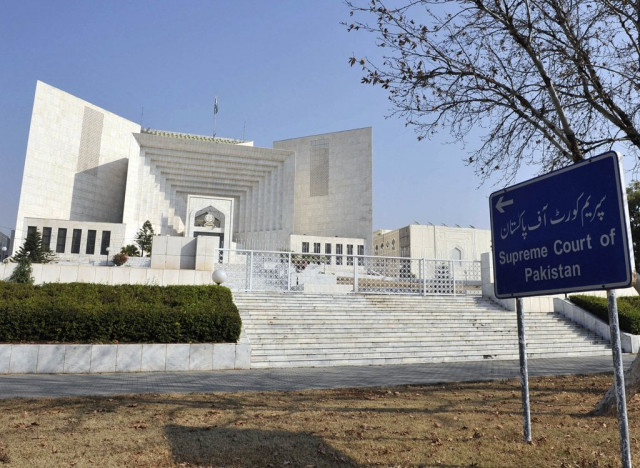Plea in SC to enforce provincial finance commission award
Petition contends that diverting funds from tax generating areas without providing adequate share 'is not equitable'

A constitutional petition is filed in the Supreme Court, seeking direction to the chief ministers of four provinces to announce the Provincial Finance Commission Award.
The petition added that the provincial award provides uniformed legal criteria and standards for the distribution of financial resources to the grassroots level in accordance with Articles 140A and 156(2) of the Constitution and by implementing the respective Local Government Laws, for the time being applicable in Pakistan.
Rana Munwar Ahmad has filed the petition under Article 184(3) of Constitution, making the federal and provincial governments as respondents.
The petition further contended that diverting funds from tax generating areas to other areas without providing adequate share in development funds and schemes for such areas “is not the equitable, balanced and fair distribution of funds under any law and principles of equity”.
"Absence of certain uniform standards and a legal basis for the distribution of state finances, using unfair and illegal discretion without adhering to the fundamental principle of regional equity, the tax generating areas have been grossly ignored by the respondents.
“This unfair financial distribution makes areas such as Karachi — that generate most of the income for the Federal as well as for the Provincial government — feel alienated.
Besides, having the largest population, it receives only a meagre share from the state finance for its development.
Likewise, gas generating areas/cities of Pakistan are kept most backward and underdeveloped in spite of adding big share to the national exchequer. Unfortunately, similar practice has been adopted by the other three provinces."
The petition involves question of public importance with reference to the enforcement of the fundamental rights conferred by the Constitution to the public at large.
The petitioner seeks judicial embargo, unto the unbridled and unchecked discretionary powers, illegally and unconstitutionally encroached by the respondents federal and provincial governments and further seeks binding interpretation of Articles 140A, 156 and 160 of the Constitution read with all enabling provisions of laws — including the statues, regulating the local government systems in all four provinces, respectively, that deal with the fiduciary powers and authority of the respondents to bring it within the realm of “constitutional reasonability” and to ensure “balanced development and regional equity” and “financial, commercial, social and economic fairness” amongst various parts of the state, in accordance with the Constitution and law in fair, transparent and just manner.
The petitioner prayed that unbridled and unchecked discretionary powers with regard to the allocation of the financial resources of the state, encroached by the federal and provincial governments be declared illegal, unconstitutional and in negation to the fundamental rights of the public at large.
It is also pleaded that respondent federal and provincial governments be restricted the use of discretionary powers with regard to allocations of development funds and distributions thereto on the political basis.
"The Provincial Finance Commission Award 2006 may be opted as criteria to ensure transparent, fair and balance distribution amongst the local and provincial governments."
It is further prayed the Supreme Court to pass direction for de-freezing the local governments funds forthwith for being illegal and unconstitutional action on the part of the respondents and direct all federal and provincial bureaucratic hierarchies, to utilise the local government funds at the district and tehsil/taluqa levels forthwith for the public welfare and betterment of the respective areas, without any restriction.
Likewise, it further prayed to restraint provincial finance secretaries for making the discretionary allocations of development funds, on the behest of the chief executives of all four provinces, forthwith.
"To announce the National Finance Commission award subject to a detailed, balanced and comprehensive plan devised under Article 156(2) of the Constitution introduced through the Provincial Finance Commission Awards in accordance with the law and constitution,"
It is further contended that the respondent provincial bureaucracy acting in absolute derogation of law and the constitution on the behest of their political high ups, usurp the fundamental rights of the public at large by withholding and freezing the local government funds for which, they have no legal authority and power.
"The provincial authorities act in violation of their legal obligations to appease the executive heads as their careers, postings and transfers are in the hands of the political elite and while doing so the public interest and well-being is totally ignored. The illegal and unconstitutional restriction, bar and ban on the development of the local areas amounts to complete derogation and violation of the law and the Constitution on part of the bureaucrats who are supposed to act in accordance with the law and the Constitution instead of appeasing the political elite and nullifying the inviolable fundamental rights of the people of Pakistan."
It is also stated that all local government laws in all four provinces, prevailing at this point in time seek to establish a balanced, equitable and fair financial arrangement between the provincial and local governments through a uniform method for the determination of the provincial allocable amounts to the local governments. This legal command has, constantly been negated by the respondents, primarily to create a colonial authority over the public at large and their elected representatives. A perpetual hesitation has been shown by the political and bureaucratic hierarchies/respondents in distributing the financial resources to the public at the grass root level.
Under the currently applicable local government laws read with Articles 3, 4, 5, 9, 25,140-A, 156 and 160 of the Constitution along with all enabling provisions of law (that are enforceable for the time being) the respondents are legally obliged for the financial distribution up to the grassroots level, through a comprehensive mechanism by adopting uniform criteria for such distribution.



















COMMENTS
Comments are moderated and generally will be posted if they are on-topic and not abusive.
For more information, please see our Comments FAQ